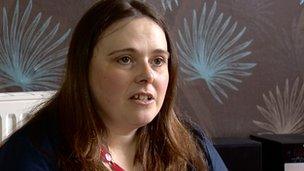Mental Welfare Commission backs suicide prevention work
- Published
People who are feeling suicidal are being helped by a new service which brings the hospital to them
The Mental Welfare Commission has given its backing to a new approach for people with serious mental health problems.
It praised the use of Intensive Home Treatment Teams (IHTT), particularly for people who feel suicidal.
Scotland has the highest suicide rate in the UK.
The commission surveyed patients, carers and health staff about the use of IHTT. It found crisis admissions had reduced.
IHTT is based on regular home visits by specialist staff. It aims to reduce the need for hospital admissions.
One of the people who has benefited is Jo Macfarlane, who has been in and out of hospital since she was a teenager.
She has schizoaffective disorder and when she is ill, she is either manically happy or really down.
She said: "In the past, I've ended up running away from hospital but also, when I'm at home before they can get me into hospital, I've ended up in all sorts of scrapes.
"I took a very serious overdose down in Oxford.

Jo Macfarlane said being treated in her home, in familiar surroundings, was much less restrictive
"I jumped off Salisbury Crags. The ambulance and firemen who came up, they were saying 'I can't believe you survived'."
The last time Jo became ill, it was suggested she was treated at home, not in hospital.
She found the IHTT programme much better for her: "It's just so different being in your own environment at home and even things like you can go for a walk.
"Sometimes I find, late at night, I just go for a walk to get rid of some of the tension.
"When I've been in hospital in the past it's always been under section, legally detained, and I've usually for most of the stay been confined to a locked ward."
Doctors involved in the programme say it can be most appropriate for people who would otherwise be kept in hospital for their own safety.
Out of hours
Dr Ihsan Kader is a consultant psychiatrist with an Intensive Home Treatment Team in Lothian, which has one of the most comprehensive services.
He said: "You will see a doctor within 24 hours and then as and when you need to - even on weekends and public holidays, out of hours, because we are open 24/7.
"We can even visit patients up to four times a day if we need to."
When home treatment was introduced as an alternative to hospital admission, concerns were expressed that it might be less safe for patients.
The Mental Welfare Commission has said that has not been the case.
Chief executive Dr Donald Lyons said: "Overwhelmingly we found that people who have received intensive home treatment were very positive about it, as were their carers.
"They felt the level of support was about right and they appreciated either not having to be admitted to hospital or, if they did have to be admitted to hospital, it was for shorter periods."
The Commission has found that provision of IHTT programmes was patchy across Scotland, and has encouraged all NHS boards to make it available.
- Published14 October 2011
- Published13 October 2011
- Published11 August 2011